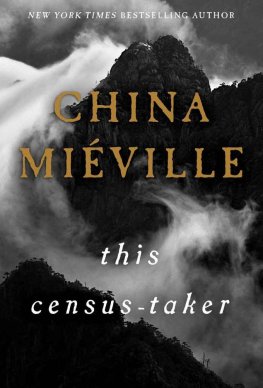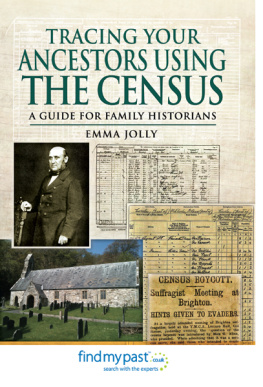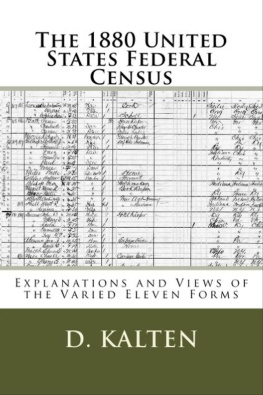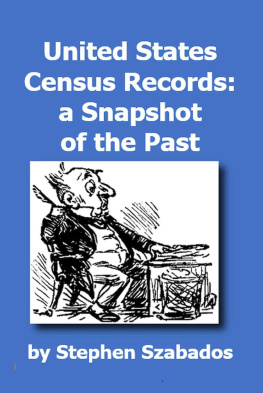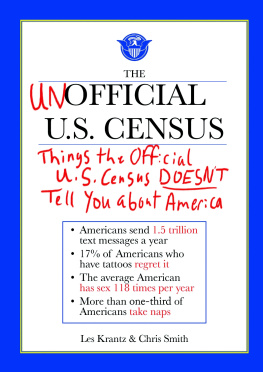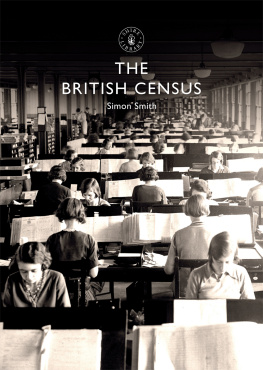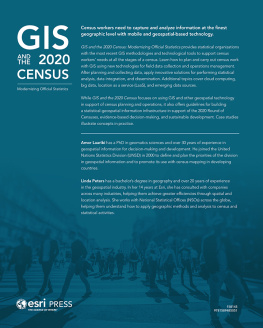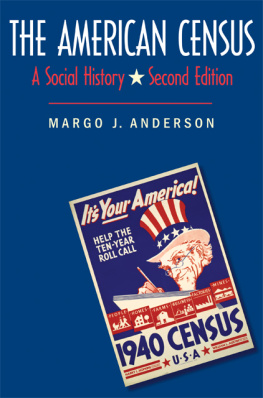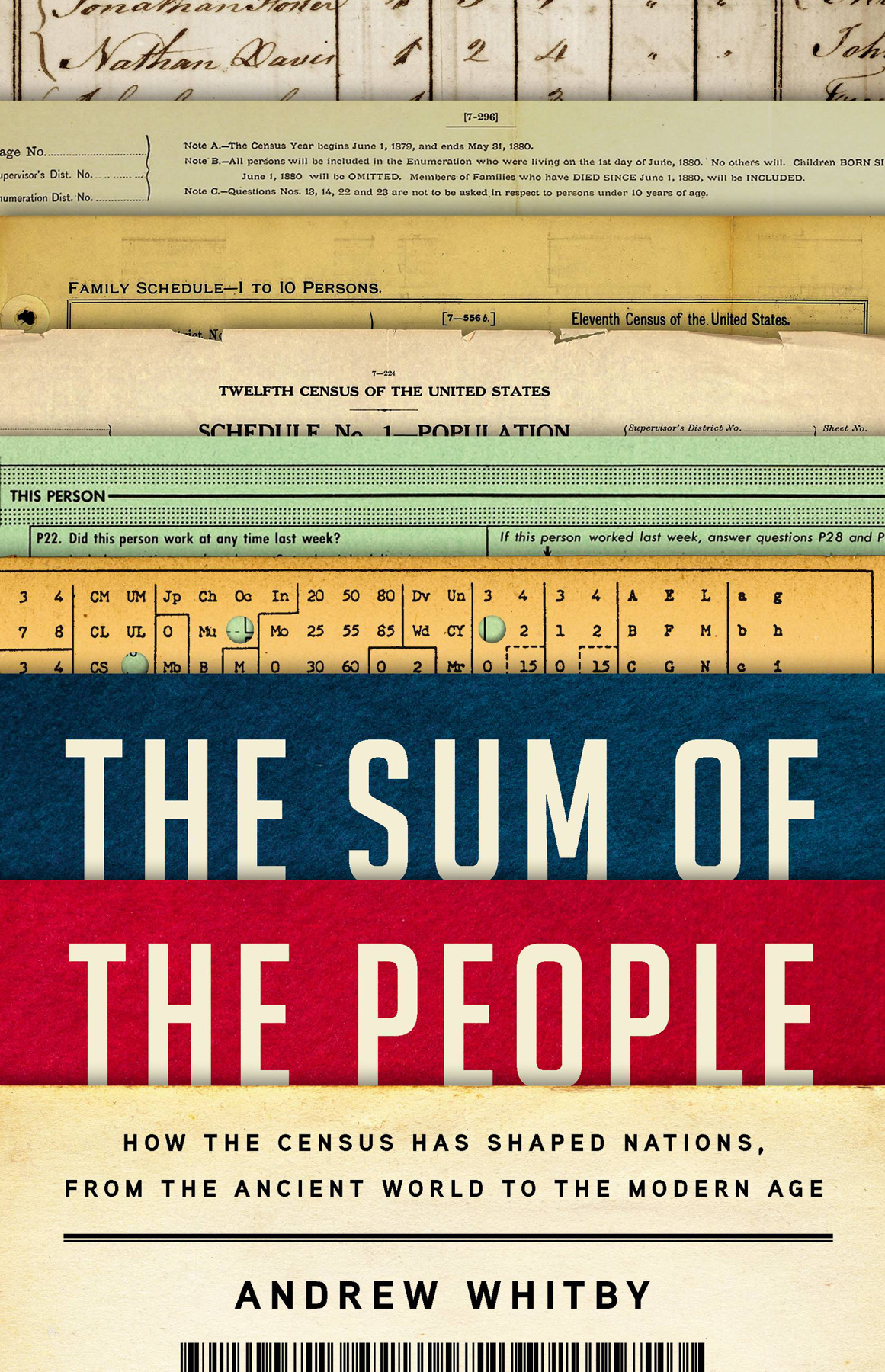Cover images: U.S. Census bureau; Truesdell, L. E. (1965). The development of punch card tabulation in the Bureau of the Census, 1890-1940: With outlines of actual tabulation programs. Washington, D.C: U.S. G.P.O.; sociologas / Shutterstock.com; OKSANA FERKHOVA / Shutterstock.com
Cover copyright 2020 Hachette Book Group, Inc.
Hachette Book Group supports the right to free expression and the value of copyright. The purpose of copyright is to encourage writers and artists to produce the creative works that enrich our culture.
The scanning, uploading, and distribution of this book without permission is a theft of the authors intellectual property. If you would like permission to use material from the book (other than for review purposes), please contact permissions@hbgusa.com. Thank you for your support of the authors rights.
Published by Basic Books, an imprint of Perseus Books, LLC, a subsidiary of Hachette Book Group, Inc. The Basic Books name and logo is a trademark of the Hachette Book Group.
The Hachette Speakers Bureau provides a wide range of authors for speaking events. To find out more, go to www.hachettespeakersbureau.com or call (866) 376-6591.
The publisher is not responsible for websites (or their content) that are not owned by the publisher.
And Moses and Eleazar the priest spake with them in the plains of Moab by Jordan near Jericho, saying, Take the sum of the people, from twenty years old and upward; as the Lord commanded Moses and the children of Israel, which went forth out of the land of Egypt.
I N THE FAR NORTH of the West Bank, just outside the village of Faqqua, Mohammed Atari stands in the generous shade of an olive grove. These trees, he tells me, are Romanan extraordinary claim, but one corroborated by their gnarled trunks, two or three arm-spans in circumference. Mohammed is dressed in a black shirt, zip-off trousers, a wide-brimmed cloth hat, and a black-and-brown keffiyeh. He watches the trailing members of our group descend the hill toward us, counting them wordlessly as they approach. He does this with his right hand, middle and index fingers extended, marking out each pair as they settle amid the trees. In total we are eighteen: fourteen Swiss tourists and their Swiss guide; me, the Australian interloper; Mohammed, Palestinian; and his colleague, Ahmed, also Palestinian, who leads a donkey named Casimiro.
One days walking ahead of us is another, larger party, of thirty Norwegians. Their guide, Nedal, does not count them directly. Instead, he has divided them into six groups of five; when they stop, each group quickly enumerates itself to check that nobody is missing. This efficient procedure is necessary because unlike us they stop often, to sing a hymn or read from the Bible. The Norwegians are pilgrims, whereas the Swiss, for the most part, are just regular touristsalbeit intrepid oneshere to enjoy the landscape, the culture and the history, as well as the physicality of traveling by foot.
Both Mohammed and Nedal watch carefully, each in his own way, over their respective flocks. Were all following the Nativity Trail, a long-distance walking route from Nazareth in Israel to Bethlehem in the West Bank, and our guides dont want us wandering off. This ancient landscape is shot through with modern lines, not all of them visible: the unhealed wounds of an unsolved conflict.
But today, under the olive trees, all is peaceful. The sun is shining, the path is relatively smooth, and the walking is easy. Mohammeds group is happy and relaxed. This is what they came for. My interest in this place is different. Though these adventurous Swiss retirees have kindly adopted me, I relate more strongly to the pious Norwegian group. Though religion is not my motivation, I too am embarking on a pilgrimage.
In fifth grade1991my parents transferred me to a well-regarded Anglican school. We werent particularly religious, but it was a good school, and I soon got used to the weekly rhythm of chapel services. One day, in the final school week of that first year, I sat on a wooden pew, stewing in the heavy, listless air of a Brisbane summer. A boy stood and took his place at the eagle-winged lectern. A reading from the book of Luke, he began, chapter two, verses one to seven (New International Version).
In those days Caesar Augustus issued a decree that a census should be taken of the entire Roman world. (This was the first census that took place while Quirinius was governor of Syria.) And everyone went to their own town to register. So Joseph also went up from the town of Nazareth in Galilee to Judea, to Bethlehem the town of David, because he belonged to the house and line of David. He went there to register with Mary, who was pledged to be married to him and was expecting a child. While they were there, the time came for the baby to be born, and she gave birth to her firstborn, a son. She wrapped him in cloths and placed him in a manger, because there was no guest room available for them.
He stumbled over Quirinius. I marveled at the exotic sound of Galilee and Judea. And of census, a word new to me.
Had I been a more attentive child, it wouldnt have been, for Australia had conducted its own census just a few months earlier, on August 6, 1991. Though I evidently took no note of it, it duly noted me among nearly seventeen million others. I imagine that my mother filled out the orange-tinted form on our kitchen bench, amid the usual pile of half-opened mail. (I was probably watching television in another room.)
Years later, now living in the United States, I found an archived blank of the 1991 Australian census form online. The Census is like a stocktake of our nation, it begins. Thats a favorite description of census takers, one that goes back more than century. I think I understand why they keep using it: whereas the suspiciously sibilant census comes from Latin, stocktaking is reassuringly Anglo-Saxon. Stocktaking suggests counting boxes on the shelves of a warehouse: this many of product A, that many of product B. A stocktaking is routine: nothing to worry, or even think particularly hard, about.
But counting people is quite different from counting boxes. People do not sit still, waiting inertly to be tallied, as boxes do. People do not come in simple varietieszero percent fat and low carbalthough statisticians sometimes like to pretend they do. There is a method to counting people, a science even, but its not accounting. Boxes are unaffected by being counted, whereas the act of counting people can oppress or empower them, or even change their self-identities. People may embrace, or resist, being counted.
Today, the vast majority of the worlds nations conduct a count of their populations at least once every decade: a decennial census, the adjective another Latin import. Between the words we use to describe it and Lukes account of the nativity, quoted above, you could be forgiven for supposing the Romans started all this, but they did not. As with laws, taxes, and religion, counting people is an institution of community that goes back as far as community itself, in ancient China, the Fertile Crescent, and probably everywhere else that people began to live together in large numbers.


